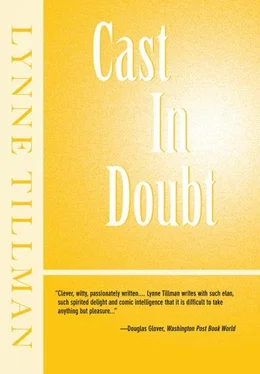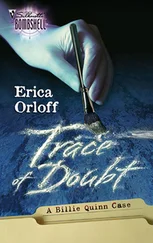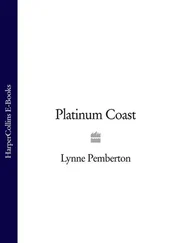Lynne Tillman
Cast in Doubt
Behind our thoughts, true and false, there is always to be found a dark background, which we are only able to bring into the light and express as a thought.
— Ludvig Vittgenstein
Then what is the question?
— Gertrude Stein
Part 1. A Dark Background
Early in the morning, in this part of the world, in the summer, the sun is so strong and direct, I believe that all the spirits must be holding that fiery globe in its heavenly place and shining it down on us. This early in the morning, and before the first news of murder or robbery, of war or famine, the sunlight casts miracles across the dark, blue water and life itself seems to emanate from its movement. I’m not a religious man, but at this time of day, when it is not yet hot, the sky is so brilliant as if to mean that something, some great secret of the world, might be revealed. Later, it is too hot even to appear on one’s porch.
The summer’s heat may have been just what her doctor ordered. Though her doctor may not actually have said anything of the sort, maybe heat, perhaps warmth, and when he said it there may have been a paternal look in his penetrating eyes. She had printed “analyst” in block letters on the cover of a book, a diary meant for thoughts and dreams.
I saw the word the first time we met. That is, technically speaking, the first time we met she showed the diary to me. A friend had given it to her, she said. I imagined it was presented to her just before she sailed away from home, before she flew away from America and then sailed overnight from Athens to Crete. It was, she suggested, with a look or just so many words, an old-fashioned gift and gesture, one that might have no relationship to their lives. It represented instead a poignant moment others might have shared. It was a kind of wistful parody. She did say parody, I think.
The hotel where I have rooms is weather-beaten, but well-kept and clean. The small whitewashed building is stark. There’s usually a bright sky overhead, and it is hard to feel dark or gloomy, except during the winter months. Generally this island life is not the right background for depression; the sky here is not for secret thoughts or mean-spirited reflection. Yet murders are committed, vile acts reported. Though I’ve lived here for quite some time, I find this unnerving, in spite of the fact that, or perhaps this is why, I write crime stories. My fascination with the gory details of life that hurtle toward us unblinkered and appalling is unabated even here. Right now I am working on a mystery based on a real-life crime that was never solved. In my book I solve it, of course. Though some things will remain open to question.
People here are open. Nectaria, the concierge, told the American girl almost immediately that there was a house left by an English painter, left standing, barely standing, in terrible shape, nearly uninhabitable and with no hot water, but she could rent it for very little money. The young woman took out her traveler’s checks and offered six months’ rent. Nectaria pushed her hand away, to indicate that she needn’t give so much in advance, but the younger woman persisted and Nectaria took the checks somewhat reluctantly, placing them in a drawer in the reception desk.
I could have had the house years ago but I had not wanted it, preferring the ministrations of Nectaria, the concierge, and her husband, Christos, who manages the restaurant down the street. The American intended to stay. She would teach English, she told me. She would live abstemiously, I thought, like a nun or a recluse. If she had the talent for it, she might draw fast, uninteresting portraits of tourists for money, though the cliché might depress her, were she to turn out to be a sensitive soul. Nectaria called her Helen, which wasn’t her name but was close enough to it, and that’s how she became known on the island.
I met Helen then, some days before she moved into Peter Bliss’ broken-down house overlooking the harbor. It had just three small rooms on as many stories — a rickety structure, but still a charming antiquity, with romantic dilapidated walls and ruined floors. Across the lane lived Chrissoula, who was caretaking Bliss’ house in his habitual absence. Nectaria handed over Helen’s traveler’s checks to Chrissoula, I believe. Chrissoula and I alone took immediately to Helen, and in fact Chrissoula loved her from the moment they met. It was an unconditional love of a kind I’d not seen before, I think, and I use unconditional advisedly as Helen was an unusual girl, one an elderly Greek woman might well be wary of. Chrissoula wasn’t, unlike some of the others of my acquaintance. In any case, Helen happily settled into Bliss’ place, which had a terrace that looked out to the harbor and the sea. It was usual to find Helen there.
To myself I sometimes called her Smith or Smitty, because of an expression that came over her face as we talked, as if she were placing a hard metal object into a blazing fire and bending it to her will. I thought she was a tough modern type but then I am one of those old, older men who find young people, young women, in particular, incomprehensible. I’ve never slept with a woman, young or old, but Smitty, if I were younger, I might have wanted to. Perhaps she is androgynous enough for me or a little dangerous. I usually find women soft or vulnerable, and that frightens me. I have a horror of hurting people. It’s pathological, I suppose. But I am never afraid to stick the knife in when I’m writing.
It wasn’t that Helen let me drop in whenever I wanted. Even when she was with me, she kept to herself, held herself in check, which is strange, I think, for a girl or young woman who’s only twenty. She liked to go for car rides, and some trace of girlishness brightened her face when she entered my little VW. I like to drive around the island; it’s my escape from the book I’m meant to be writing.
My real work is based on my family; my great-grandfather was a man of some importance. The family are figures in a novel I have been struggling with for years now. When Helen entered my life I was stuck at the Civil War or rather that period just before it. My maternal line was feminist and abolitionist, and my paternal line was neither. Certainly not feminist, and some held slaves, probably using Mr. Jefferson as justification, though that’s nowhere in any of the letters or diaries in my possession. Helen doesn’t yet know about the mysteries I toss off, as if I were wanking not writing. Still I must admit I enjoy writing them very much. The other, purely literary venture is speculative and nonremunerative, but as I tell my young friend, if nothing else, it fills the time. I know Helen finds this notion abhorrent or worse. Young people don’t fill time.
I can see her from my small terrace. She is on her larger terrace wearing a romantic broad-brimmed straw hat; it is tilted back on her head. She is reading. She seems to be consuming all the books in Bliss’ library. I know he has everything Matthew Arnold, Flaubert, and Walter Pater ever wrote, and I’m sure some of these are curiosities to Helen, though she’s diligently plowing through each, I believe. It’s reassuring since one hears so much about how young people these days don’t read. When I awaken in the morning she’s always already there on her terrace. She’s adopted a kitten which the Cretans might have killed since they have scant affection for pets.
I awaken much later than my young friend and my mornings are groggy. I drink too much, particularly in the summer months, but I never drink before five, and then, if I do, I always dilute my wine with water. Some in my line were alcoholic but none died in the gutter. Some even died in bed. I imagine I’ll go quietly. That is how I envision it, my end. I will be content, happy to go, surrounded by angels that I’ve hallucinated, Caravaggesque ones that will dance around me, supple fleshy bodies cavorting as the light grows dimmer and dimmer. Wait, don’t leave, I’ll cry. I think about death rather a lot since having turned sixty-five.
Читать дальше












